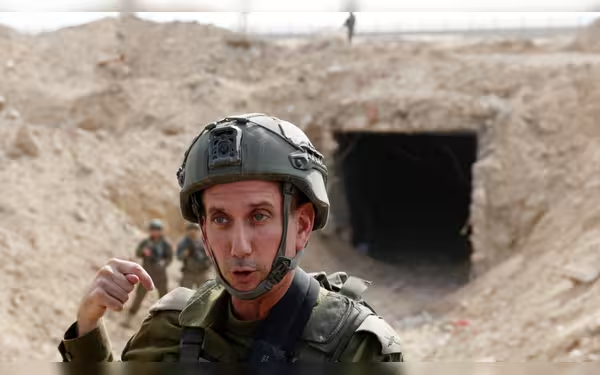Saturday, November 16, 2024 05:42 PM
Israeli Army Vows to Rescue Hostages in Gaza Conflict
- Israeli army emphasizes urgency in hostage rescue efforts.
- Humanitarian crisis in Gaza worsens amid ongoing conflict.
- Control of Philadelphi Corridor crucial for ceasefire negotiations.
 Image Credits: arabnewspk
Image Credits: arabnewspkThe Israeli army reaffirms commitment to rescue hostages in Gaza as humanitarian crisis deepens amid ongoing conflict.
The ongoing conflict in Gaza has taken a devastating toll on both sides, with the Israeli army recently reaffirming its commitment to rescue hostages held by Hamas. In a press briefing held in the war-torn city of Rafah, military spokesman Daniel Hagari emphasized the urgency of the situation, stating, "We need to do everything, everything we can, in all means, to bring them back home." This statement underscores the Israeli government's determination to address the hostage crisis as part of its broader military objectives.
The backdrop of this conflict is marked by a series of tragic events. Following Hamas's unprecedented attack on Israel, which resulted in the deaths of over 1,200 individuals, the situation escalated dramatically. Among those taken captive, 97 hostages remain in Gaza, with reports indicating that 33 of them are believed to be deceased. The emotional impact of these losses has sparked widespread grief and frustration within Israel, where many citizens feel that their government is not doing enough to negotiate a resolution that would secure the release of the remaining hostages.
As the conflict continues, the humanitarian crisis in Gaza has deepened. According to the health ministry in Gaza, Israeli retaliatory strikes have claimed the lives of at least 41,118 people, with a significant portion of the casualties being women and children. The United Nations has raised alarms about the dire conditions faced by civilians in the region, as independent media access to Gaza has been severely restricted during this prolonged conflict.
In Rafah, the destruction is palpable. Footage from AFPTV reveals streets littered with the remnants of bombed-out buildings, many of which have partially collapsed. Hagari explained that the Israeli military's strategy involves targeting the extensive network of tunnels that Hamas has constructed beneath the city. He stated, "You have a maze of tunnels here, a maze of tunnels here in Rafah, underneath the houses. This is why the destruction." The Israeli army believes that controlling these tunnels is crucial to defeating Hamas and preventing further attacks.
Another critical aspect of the conflict is the Philadelphi Corridor, a narrow strip of land that has become a focal point in ceasefire negotiations mediated by Egypt, Qatar, and the United States. Israeli Prime Minister Benjamin Netanyahu has emphasized the importance of maintaining control over this corridor to prevent arms smuggling from Egypt into Gaza. Meanwhile, Hamas continues to demand a complete Israeli withdrawal from the territory, complicating the prospects for peace.
As the situation in Gaza remains fluid, the international community watches closely, hoping for a resolution that prioritizes the safety and well-being of all civilians affected by this conflict. The plight of hostages and the humanitarian crisis in Gaza serve as stark reminders of the urgent need for dialogue and diplomacy in the pursuit of lasting peace. The path forward may be fraught with challenges, but the voices of those yearning for peace must not be overlooked.













